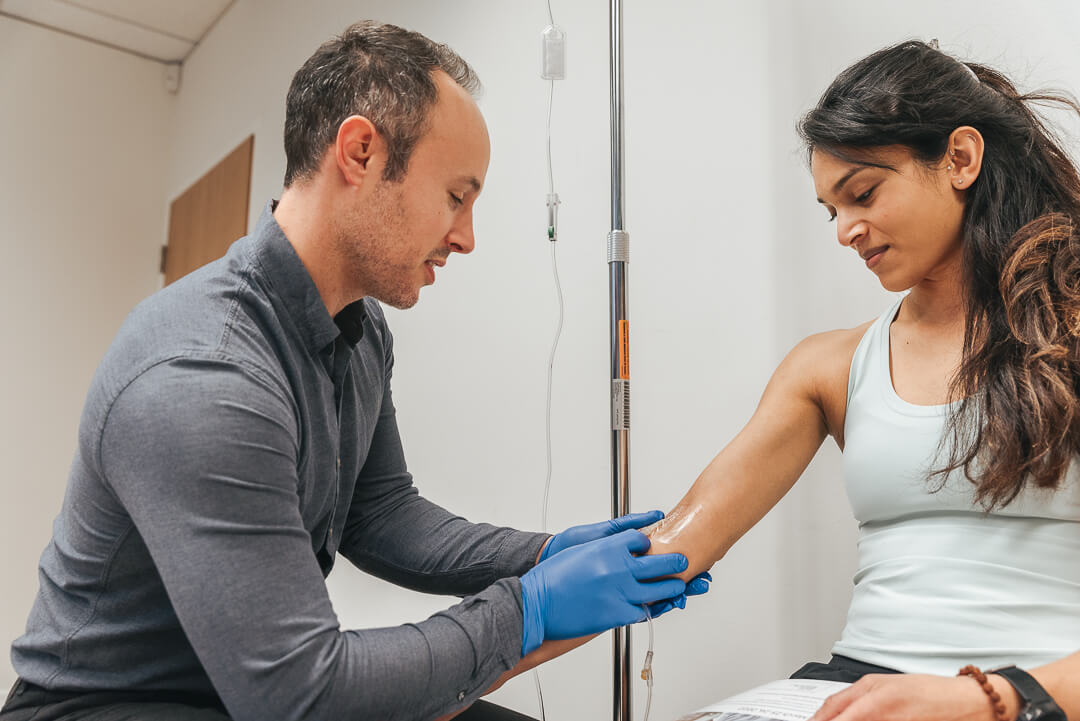Glutathione is an important antioxidant produced naturally in your body. It helps to protect cells from damage, preserve energy levels, and improve overall health. Recently, glutathione infusions have become increasingly popular as a way to give your body an extra dose of this essential antioxidant. But what is the science behind it? Let’s take a closer look at glutathione infusion and its potential benefits for your health.
What is Glutathione?
Glutathione is an antioxidant found in all cells in your body and plays an important role in many biological processes. It acts as a detoxifying agent, helping to rid the body of toxins such as heavy metals and other pollutants. Additionally, glutathione helps to regulate cell growth, DNA repair, immune system responses, and antioxidant activity. In short, having sufficient amounts of glutathione in your system allows for optimal functioning of all these processes.
The Benefits of Glutathione Infusions
Although you can get some glutathione through diet or supplements, one of the best ways to increase your levels of this powerful antioxidant is through a glutathione infusion. An infusion involves injecting a concentrated solution of glutathione directly into the bloodstream. This ensures that the maximum amount of this nutrient is delivered quickly and efficiently into the body where it can be put to immediate use.
Studies have shown that these infusions can help reduce inflammation caused by oxidative stress and improve detoxification pathways in the body. Some research has even suggested that regular infusions may help improve symptoms associated with chronic illnesses like diabetes and Parkinson’s disease.
Glutathione infusions are also commonly used as part of anti-aging treatments since they help to reduce wrinkles and dark spots on skin due to their ability to reduce oxidative stress from ultraviolet radiation exposure. In addition to providing aesthetic benefits, these infusions may also help boost energy levels due to their ability to restore depleted nutrient stores in the body.

Glutathione and Parkinson’s Disease
Several studies have looked into Glutathione’s potential for treating Parkinson’s disease, a chronic neurodegenerative disorder characterized by motor and cognitive impairment.
A study published in 2015 that looked at both animal models and human clinical trials found that intravenous glutathione could provide symptomatic relief when used as an adjunct to conventional treatments. This research showed that it was safe, well-tolerated, and effective at reducing motor symptoms such as rigidity and bradykinesia.
More recently, a 2018 systematic review of clinical evidence found that using glutathione injections in combination with levodopa was significantly more effective than standard treatment alone. The results suggest that glutathione may help alleviate the motor symptoms associated with Parkinson’s while also potentially mitigating side effects from traditional medications.
Overall, several studies have shown promising findings indicating that intravenous glutathione can improve motor symptoms associated with Parkinson’s disease. As more research is conducted, it may become an increasingly viable option for patients seeking additional treatment options.

Glutathione in aesthetic and anti-aging medicine
Intravenous glutathione has become a popular choice for aesthetic and anti-aging applications in recent years. Research has suggested that it may be a safe and effective way to improve skin complexion, reduce signs of aging, and increase overall appearance.
A 2017 study from the University of Messina looked at the use of glutathione injections as an anti-aging treatment for the face and neck. The study found that using intravenous glutathione was an effective means of reducing wrinkles and improving skin texture, elasticity, tone and firmness. It also appeared to have some protective effects against UV radiation-induced damage such as pigmentation, inflammatory reactions, and skin atrophy.
In addition to its potential for treating the visible signs of aging, glutathione therapy has also been studied for its ability to correct pigmentation issues such as melasma and hyperpigmentation. A 2008 case series from Saudi Arabia showed that a combination of oral doses and topical application of glutithione could lead to significant improvement in facial discoloration over time.
Overall, there is growing evidence suggesting that intravenous glutathione can have beneficial effects on aesthetic medicine when used correctly. While more research is needed to confirm its efficacy in this area, it appears to offer promising results when used in conjunction with other treatments.
Glutathione and Multiple Sclerosis
Multiple sclerosis (MS) is an autoimmune disorder in which the body’s own immune system attacks and damages nerve cells. Recent research has suggested that glutathione may have potential for treating MS, as it is known to possess anti-inflammatory and antioxidant properties.
A 2006 study from Belgium explored the effects of intravenous glutathione on MS patients who had previously failed to respond to conventional therapies. After 8 weeks of treatment with glutathione, researchers found that the majority of patients experienced significant improvements in their physical symptoms. Notably, these improvements were sustained during 12 months of follow up.
More recently, a 2017 systematic review looked at the use of intramuscular or intravenous glutathione injections in combination with interferon beta-1a for treating MS relapses. The results showed that this approach was more effective than just using interferon alone, resulting in better control of symptoms such as motor weakness and visual impairment.
Overall, while further research is needed to fully evaluate its potential, there is evidence suggesting that glutathione injections may be a safe and effective treatment option for certain types of MS-related symptoms. In particular, they appear to be beneficial when used as an adjunct therapy alongside existing medications.

Glutathione and Diabetes
Glutathione has long been studied for its potential role in treating diabetes. Research has suggested that it may be effective at reducing oxidative stress and inflammation, both of which are associated with the development of type 2 diabetes.
In a 2002 study from the University of Modena, researchers looked at the effects of intravenous glutathione injections on 42 diabetic patients. After 12 weeks of treatment, participants had significantly improved their blood sugar levels, as well as their lipid profile parameters. Moreover, 82% of them experienced an improvement in back pain and other physical symptoms.
A more recent 2011 study examined the effects of oral supplementation with glutathione on diabetic patients who had previously failed to respond to insulin therapy. The results showed that those receiving glutathione achieved better glycemic control compared to those receiving just insulin treatment alone. Additionally, they had improved scores on measures such as body mass index (BMI) and waist circumference.
Overall, while more research is needed to fully understand its potential in this area, there is evidence suggesting that glutathione may be beneficial in managing some of the symptoms associated with diabetes. In particular, it appears to offer promising results when used together with conventional therapies such as insulin injections or oral anti-diabetic drugs.
Conclusion
Glutathione infusions are becoming increasingly popular around the world for the health benefits it provides. Results have been particularly impressive when used to treat conditions such as Parkinson’s Disease, Anti-aging, multiple sclerosis and diabetes. Despite this, it is recommended that potential users only seek experienced healthcare professionals who can accurately prescribe the correct dose for them. We know that glutathione infusions provide substantial outcomes but it must be taken responsibly, in order to reach its full efficacy. At the very least, we recommend doing research prior to embarking on any type of treatment journey. To discover more information about our services and procedures involved in administering glutathione infusions please don’t hesitate to contact us today – we’d be more than happy to answer any questions or queries you may have!
Sources
Sharma V., et al., “Intravenous administration of reduced glutathione: A potential approach for therapy of patients with Parkinson’s Disease,” Neurochem Res (2015), doi: 10.1007/s11064-015-1510-6
Jubinsky P., et al., “Glutathione Therapy for Parkinson’s Disease: A Systematic Review,” Oxidative Medicine & Cellular Longevity (2018), doi: 10.1155/2018/1283082
De Keyser J., et al., “Intravenous glutathione in multiple sclerosis,” Neurology (2006), doi: 10.1212/01.wnl.0000232530.30045.bd
Batocchi AP., et al.,”Glutathione plus Interferon Beta-1a Versus Interferon Beta-1a Monotherapy for Multiple Sclerosis Relapses: A Systematic Review,” Neurol Clin Pract (2017), doi: 10.1097/ncp.0000000000000455
Cogliandro AF., et al., “Glutathione iv infusion: An innovative tool for antiglycation strategy,” J Eur Acad Dermatol Venereol (2017), doi: 10.1111/jdv.14146
Almutairi A., et al., “Oral Glutathione as a Novel Treatment Modality for Melasma,” Dermatol Res Pract (2008), doi: 10.1155/2008/420464
Mocchegiani E., et al., “Oxidative Stress Parameters in Diabetics Before and After Intravenous Glutathione Therapy,” Free Radic Res (2002), doi: 10.1080/1071576021000051371
Kumar AK., et al.,”Metabolic Effects of Oral Glutathione Therapy in Type 2 Diabetics Not Responding to Sulfonylurea Drugs,” Nutrition & Metabolism (2011), doi: 10.1186/1743-7075-8-71





